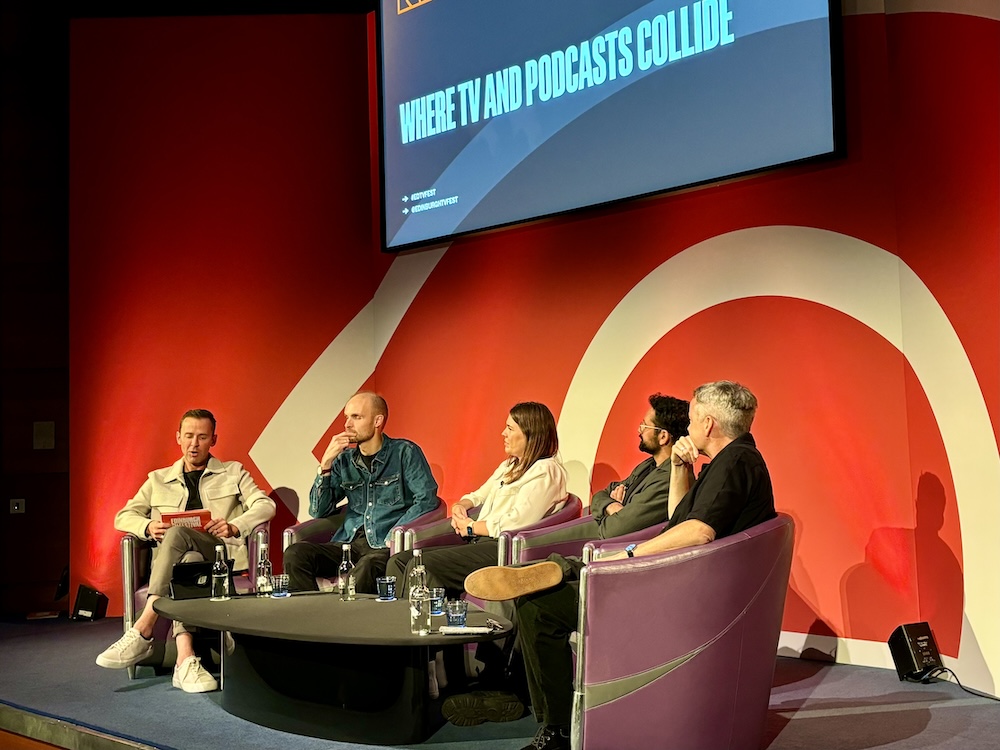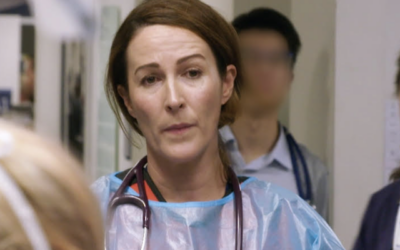In a recent session at the Edinburgh TV Festival, a panel of industry experts—Darby Dorras, Lisa Higginson, Simran Shah, and Neil McCallum—came together to discuss the evolving relationship between podcasting and television. The conversation illuminated how the two mediums are increasingly blending, creating fresh opportunities for content creation and audience engagement. Here’s a summary of the key insights from the session, along with the key takeaways.
The Growing Synergy Between Podcasting and Television
The session kicked off with a discussion on the growing convergence of podcasting and television, particularly in the realm of companion shows. Neil McCallum, Commissioning Editor of Entertainment at the BBC, highlighted “The Traitors Uncloaked” as a pioneering example of this trend. The podcast, which was directly commissioned for TV, marked a significant milestone for both mediums. McCallum emphasised how the show’s success underscored the potential of podcasts to enhance television content, offering audiences a more intimate and informal way to connect with their favourite programs.
Challenges and Opportunities in Merging Formats
Darby Dorras, Director of Content at Listen, delved into the challenges of creating content that resonates in both visual and audio formats. He acknowledged the inherent difficulties in balancing these mediums but pointed out that the rewards can be substantial. The success of “The Traitors Uncloaked” was attributed to its ability to maintain an intimate, conversation-driven format that appealed to both podcast and TV audiences, illustrating the potential for creative crossovers.
The Role of Audience Expectation and Engagement
Simran Shah, Commissioning Editor of Reality and Entertainment at Channel 4, discussed the differing expectations between TV and podcast audiences. While TV viewers typically expect high production values and polished content, podcast listeners often prefer a more relaxed and authentic approach. Shah highlighted how this difference presents both challenges and opportunities for content creators aiming to bridge the gap between these two formats.
Leveraging Social Media for Engagement
The panelists collectively emphasised the critical role of social media in promoting podcast content, especially when it transitions to television. Darby Dorras shared insights into how social media can be leveraged to drive engagement and build a community around a show. He cited examples where social media clips of podcast content went viral, significantly boosting the visibility of related TV programs.
Innovation in Content Delivery
Lisa Higginson, Senior Content Director at Audible UK, discussed innovative approaches to content delivery, particularly in integrating TV intellectual property (IP) into podcasts and vice versa. She highlighted Audible’s success with projects like “Buffy the Vampire Slayer,” where beloved TV characters were reimagined in audio formats. Higginson noted that this strategy not only taps into existing fan bases but also introduces the content to new audiences, demonstrating the flexibility and creative potential of audio storytelling.
Future Directions for Podcasting and TV Integration
Looking to the future, the panelists were optimistic about the continued blending of podcasting and television. Neil McCallum and Darby Dorras both anticipated more companion shows, greater experimentation with format and tone, and the exploration of new monetisation strategies. Simran Shah emphasised the importance of creating immersive, multi-platform content that spans TV, podcasts, and other digital media. The discussion underscored the potential for this evolving landscape to redefine how audiences consume content.
Key Takeaways
•Convergence of Mediums: Podcasting and television are increasingly intersecting, with companion shows like “The Traitors Uncloaked” demonstrating the potential of this synergy.
•Audience Expectations: Content creators must navigate different audience expectations between TV and podcasts, balancing the need for high production values with the authenticity that podcast listeners value.
•Social Media’s Role: Social media is crucial for promoting and expanding the reach of podcast content, especially when transitioning to TV.
•Innovation in Content Creation: There is significant potential in integrating TV IP into podcasts and vice versa, offering new ways to engage with established fan bases.
•Future Trends: The future will likely see more experimentation with formats, greater blending of podcast and TV content, and the creation of immersive, multi-platform experiences.
We’ll be delving deeper into the world of TV and podcasts at this year’s TellyCast Digital Content Forum





